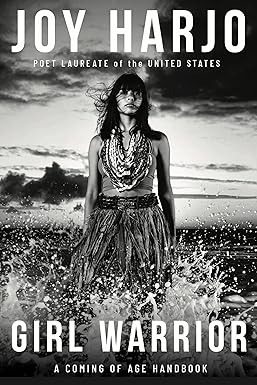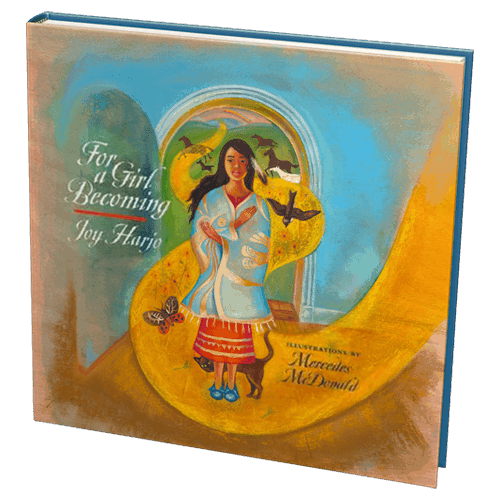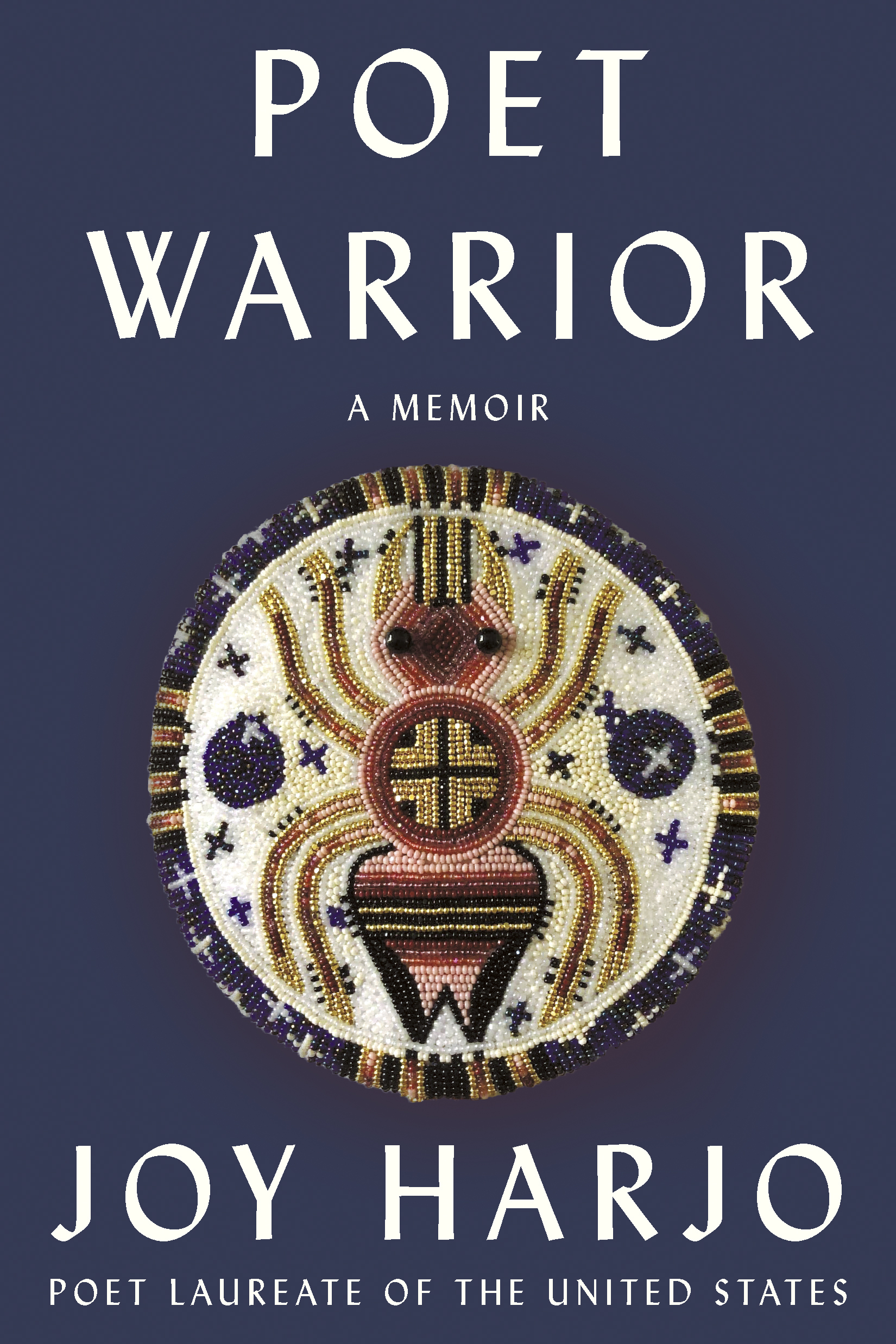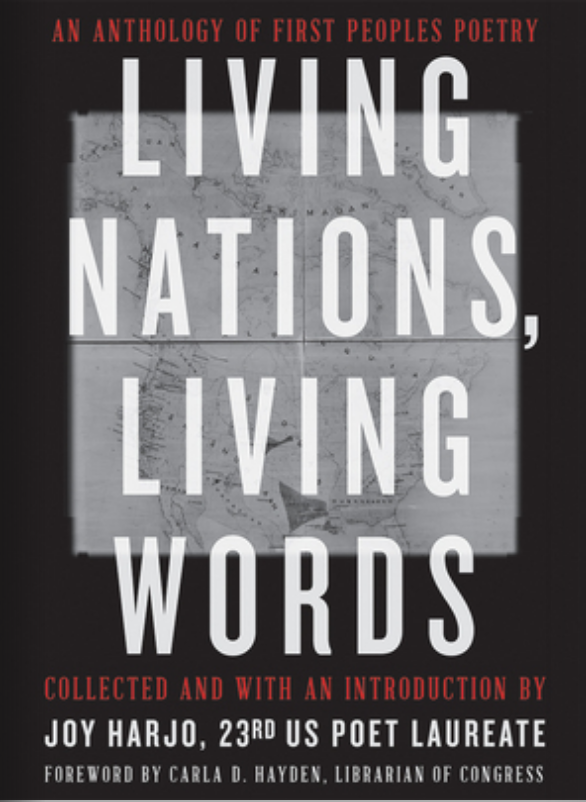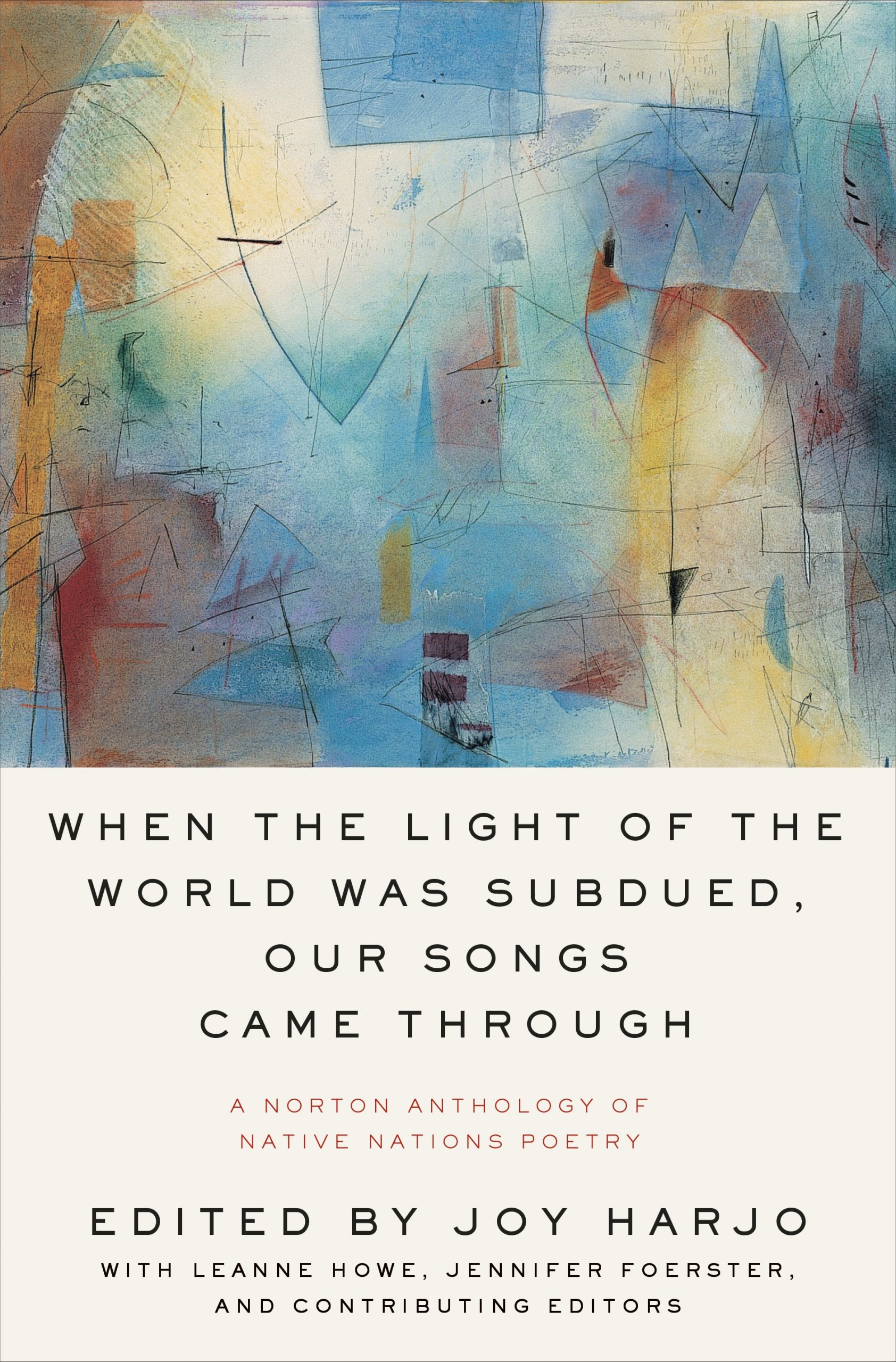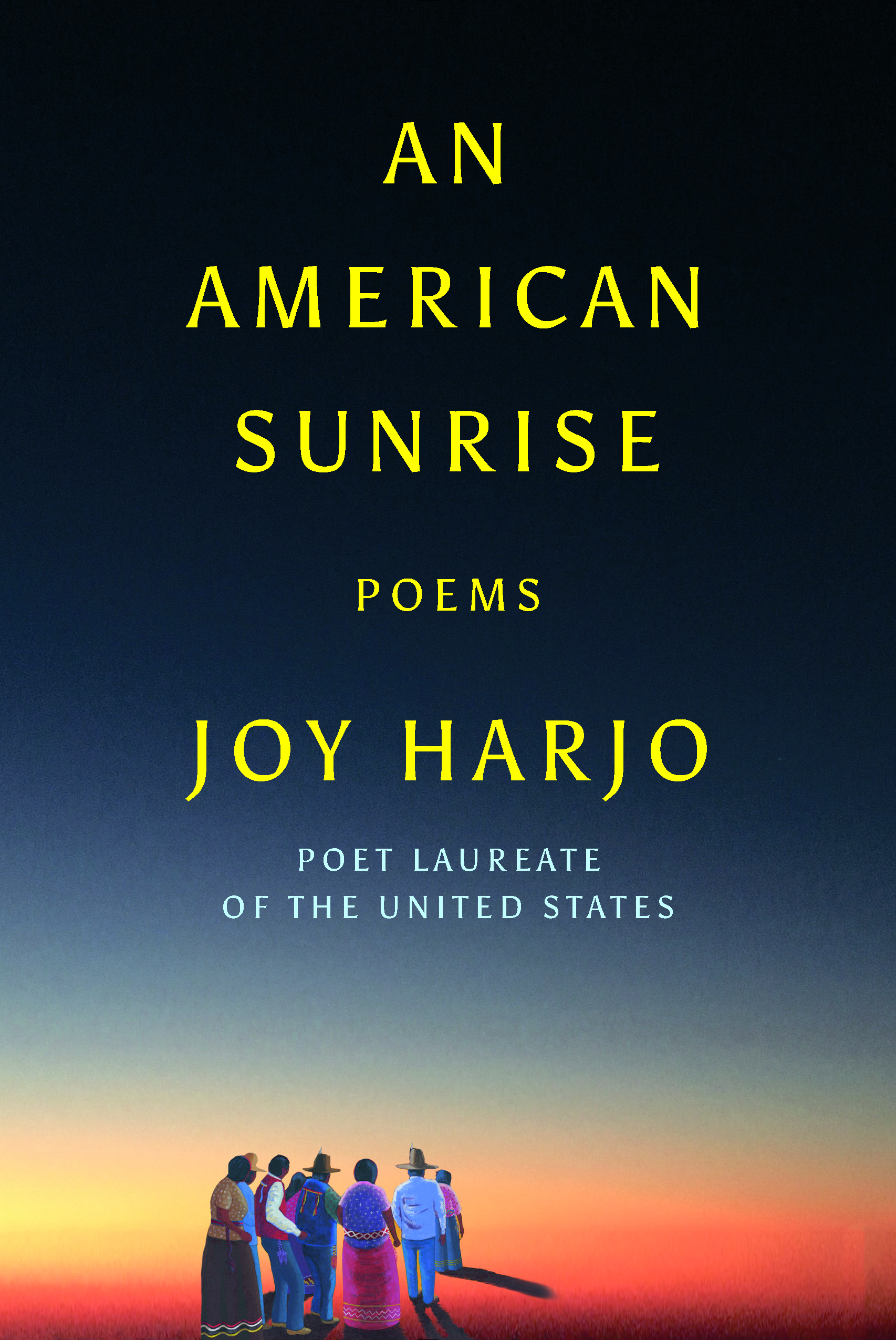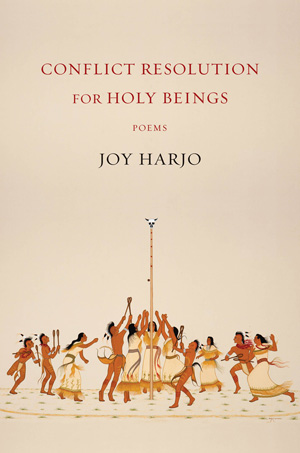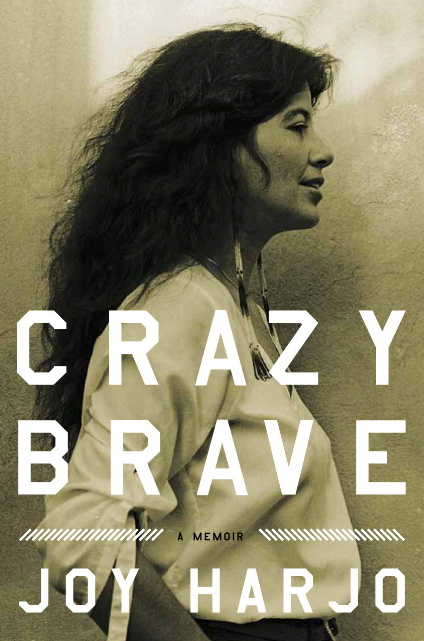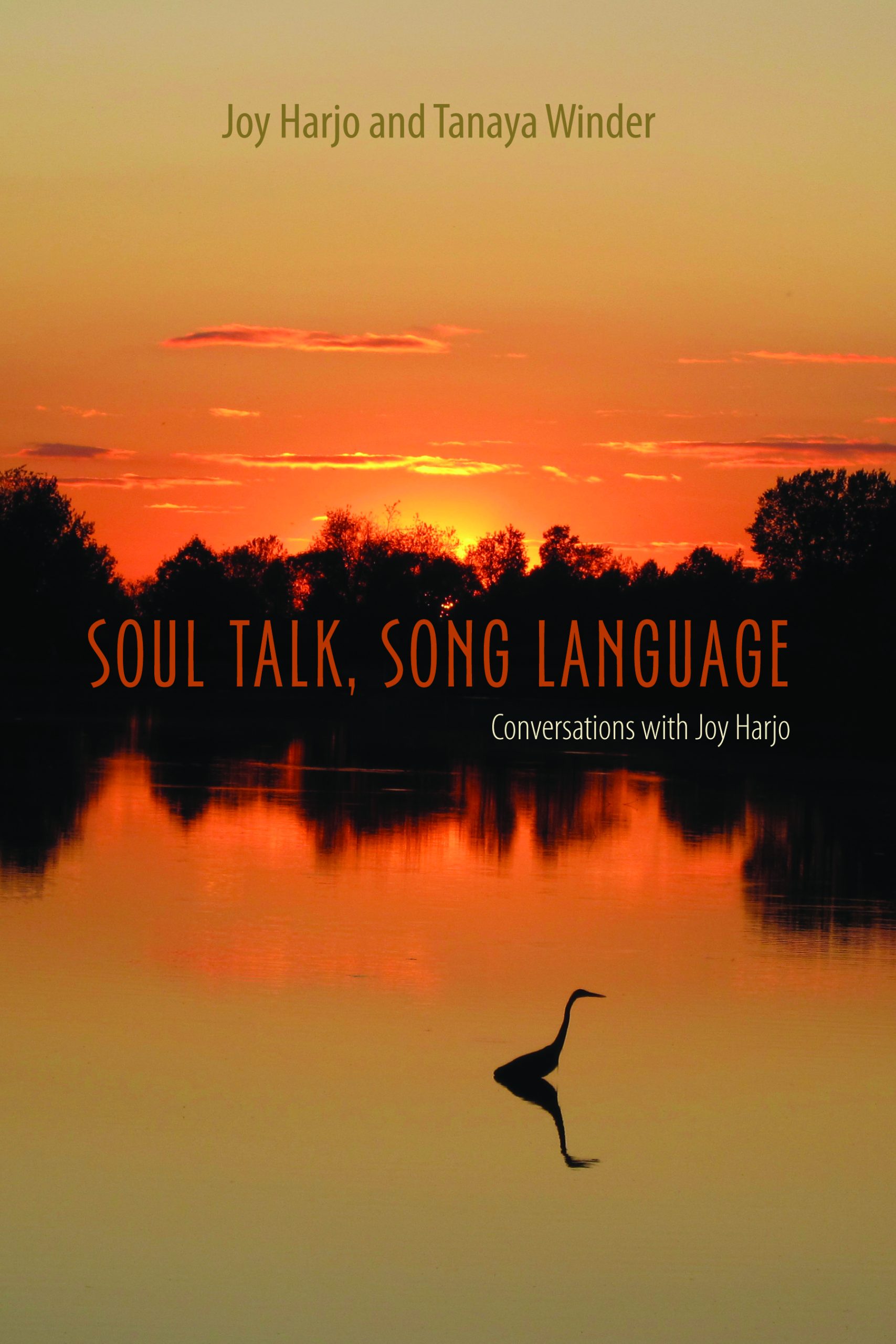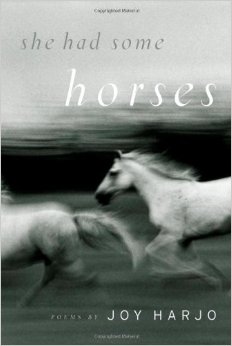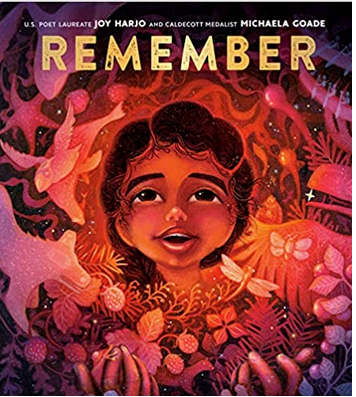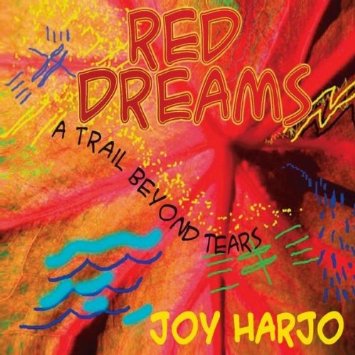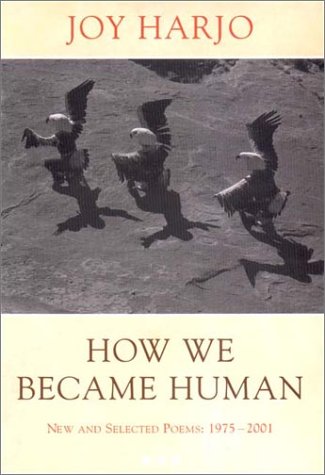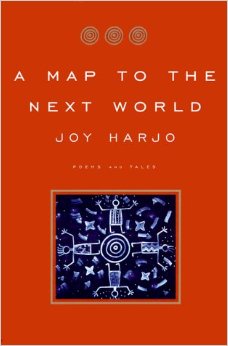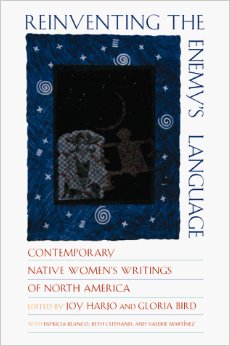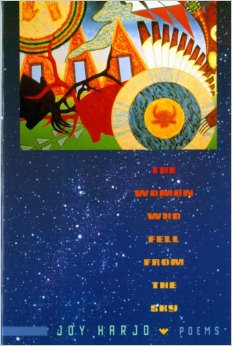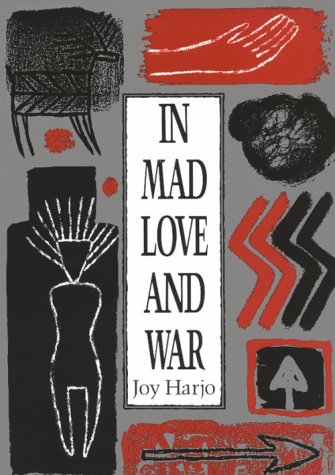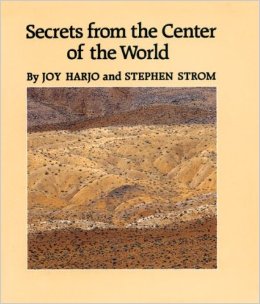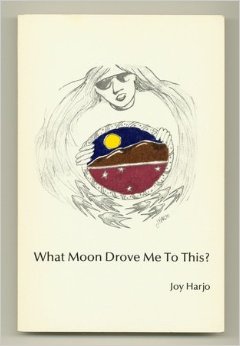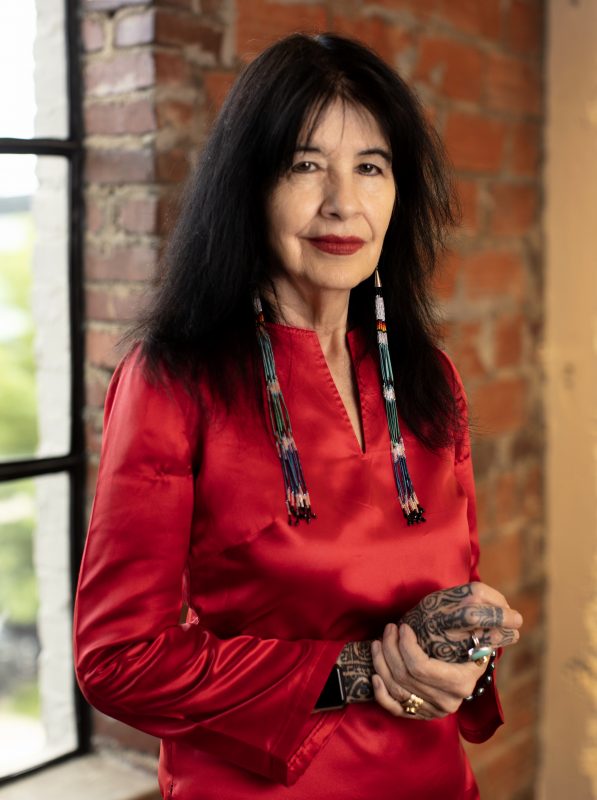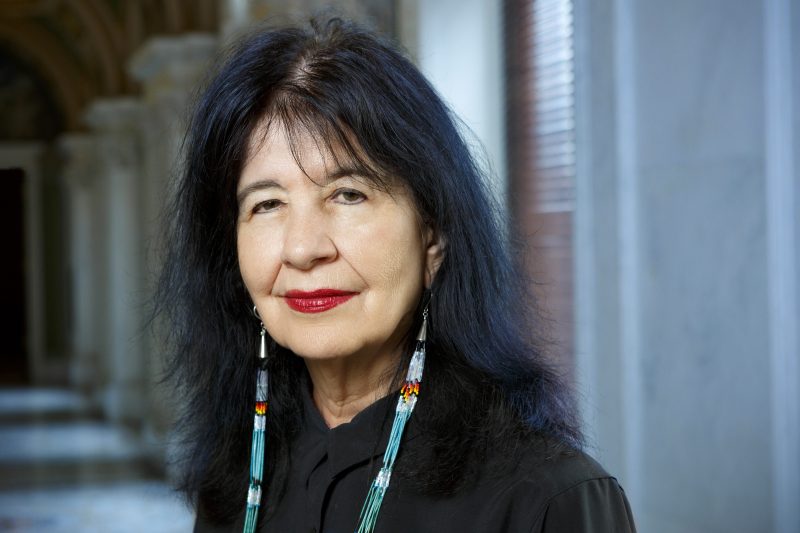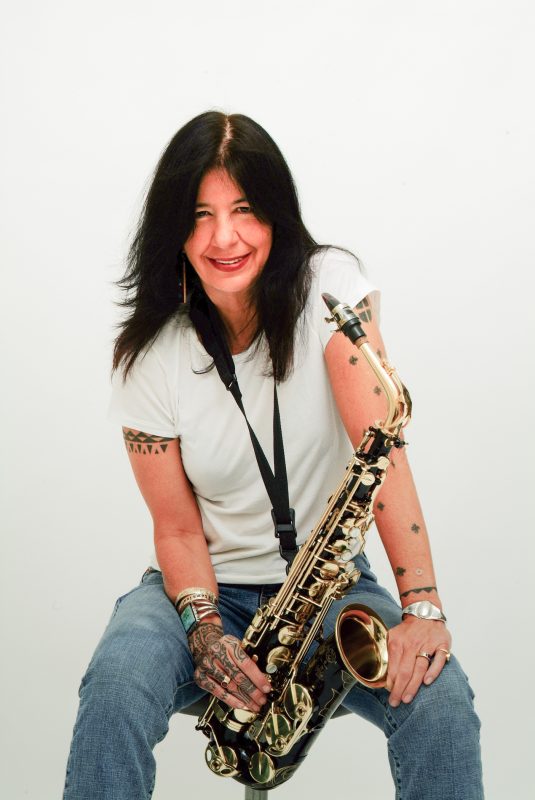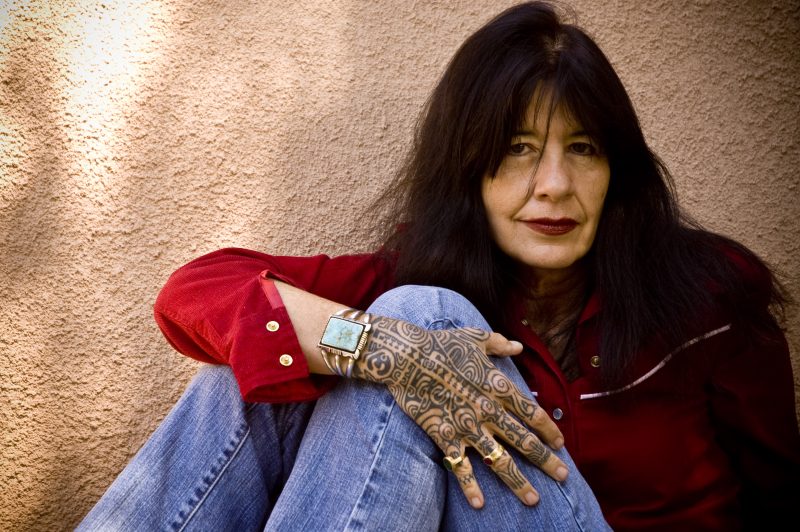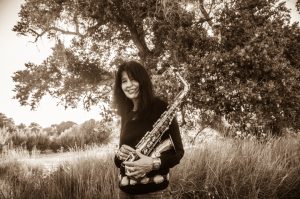
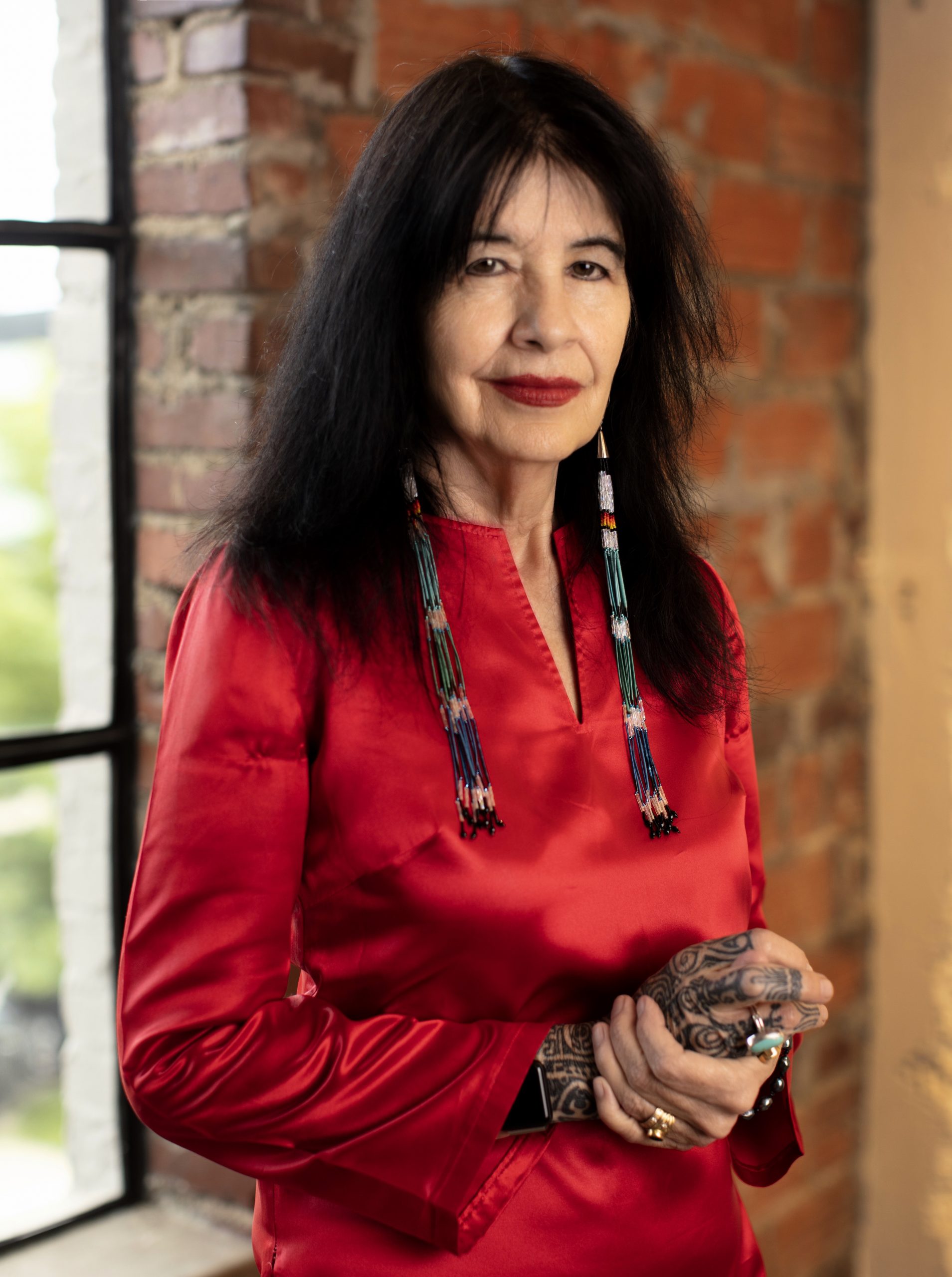
Joy Harjo
United States Poet Laureate (2019-2022)
NBCC Lifetime Achievement Award
PEN USA Literary Award for Nonfiction

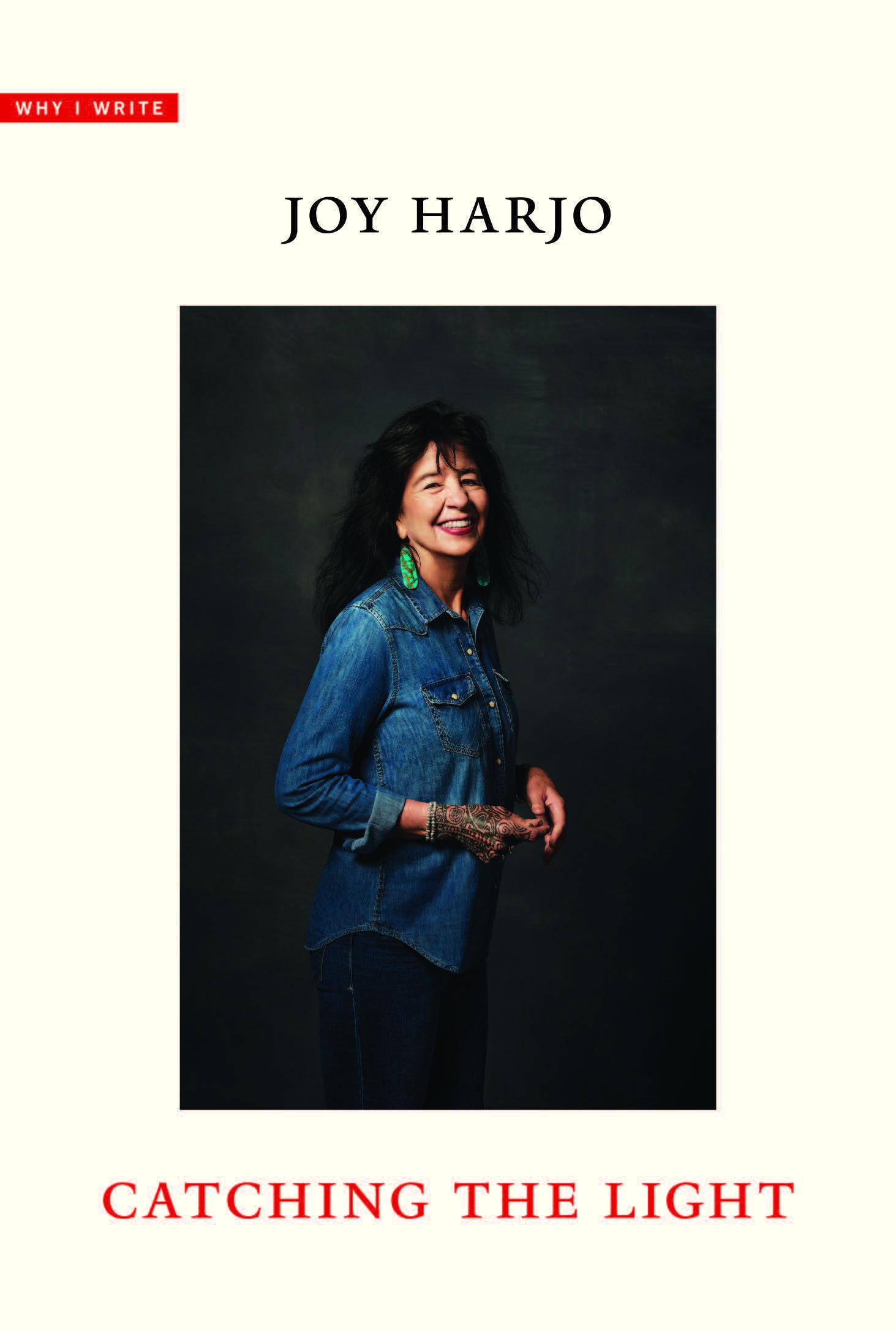
Readings &
Lecture Topics
- An Evening with Joy Harjo
Biography
“I turn and return to Harjo’s poetry for her breathtaking complex witness and for her world-remaking language.” —Adrienne Rich
“Throughout her extraordinary career as poet, storyteller, musician, memoirist, playwright and activist, Joy Harjo has worked to expand our American language, culture, and soul.” —Alicia Ostriker, Wallace Stevens Award Judges Citation
“Defining the poet’s role as a ‘journey for truth, for justice,’ Harjo explores the role of the artist in society, the quest for love, the links among the arts, what constitutes family, and what it means to be human.” —Library Journal
“[Joy Harjo’s] work is a thrilling and necessary antidote to false news, the ephemera of digital celebrity, and other derelictions. It pushes vigorously back against forgetfulness, injustice, and negligence at every level of contemporary life. Her work moves us because it is in the continual motion of bringing forward, with grace but also acuity, our collective story, always in progress.” —Don Share
In 2019, Joy Harjo was appointed the 23rd United States Poet Laureate, the first Native American to hold the position, and only the second poet to be appointed a third term. Born in Tulsa, Oklahoma, Harjo is an internationally renowned performer and writer of the Muscogee (Creek) Nation. She is the author of ten books of poetry, several plays and children’s books, and two memoirs.
In 2019, Jackson Poetry Prize judges Ada Limón, Alicia Ostriker, and D. A. Powell declared her poetry as work that “speaks not only to the world we live in, but to the unseen world that moves through us, the thread that has connected us all from the start. Harjo’s poems embody a rich physicality and movement; they begin in the ear and the eye, they go on to live and hum inside the body. Throughout her luminous and substantial body of work, there is a sense of timelessness, of ongoingness, of history repeating; these are poems that hold us up to the truth and insist we pay attention.” Her poetry collections include An American Sunrise (W.W. Norton, 2019); Conflict Resolution for Holy Beings (W. W. Norton, 2015)—shortlisted for the 2016 Griffin Poetry Prize and added to ALA’s 2016 Notable Books List, this book is hailed by Yusef Komunyakaa as “a marvelous instrument that veins through a dark lode of American history”; How We Became Human: New and Selected Poems (W. W. Norton, 2004); and She Had Some Horses (Thunders Mouth Press, 1997). Weaving Sundown in a Scarlet Light: Fifty Poems for Fifty Years (W. W. Norton, 2022) is a magnificent selection of fifty poems in tribute to Harjo’s fifty years as a poet. Washing My Mother’s Body (Penguin Random House, 2025) is a beautifully illustrated version of Harjo’s famous eponymous poem and features evocative watercolor illustrations by award-winning Muscogee artist, Dana Tiger.
Her first memoir Crazy Brave (W.W. Norton, 2012) won several awards including the PEN USA Literary Award for Creative Nonfiction and the American Book Award. It was praised by Ms Magazine as, “an unself-conscious mix of autobiography, spiritual rumination, cultural evaluation, history and political analysis told in simple but authoritative and deeply poetic prose.” Harjo’s second memoir, Poet Warrior (W. W. Norton, 2021), invites us to travel along the heartaches, losses, and humble realizations of her “poet-warrior” road. In 2011, Wesleyan University Press published Soul Talk, Song Language (Wesleyan, 2011), a collection of Harjo’s essays and interviews. Harjo delivered the 2021 Windham-Campbell Lecture at Yale, part of the virtual Windham-Campbell Prize Festival that year. That lecture was the basis for Catching the Light, (Yale University Press, 2022), which examines the power of words and how poetry summons us toward justice and healing and was published as part of Yale University Press’ Why I Write series. Her newest memoir, Girl Warrior: A Coming of Age Handbook (W.W. Norton) is forthcoming in October 2025.
She has published three award-winning children’s books. In 2000, Harjo debuted The Good Luck Cat (Harcourt, 2000). A few years later, she authored the young adult, coming-of-age book, For A Girl Becoming (University of Arizona Press, 2009), which won a Moonbeam Award and a Silver Medal from the Independent Publishers Awards. Her most recent, Remember (Penguin Random House, 2022), is an illustrated version of her Harjo’s iconic poem “Remember;” the collaboration was a National bestseller, an American Indian Library Association Honor Book, won a Boston Globe–Horn Book Honor Award, and was named one of the best books of the year by School Library Journal, Publishers Weekly, NPR, and Kirkus Reviews.
Harjo is executive editor of the anthology When the Light of the World was Subdued, Our Songs Came Through — A Norton Anthology of Native Nations Poetry and the editor of Living Nations, Living Words: An Anthology of First Peoples Poetry, the companion anthology to her signature Poet Laureate project featuring a sampling of work by 47 Native Nations poets through an interactive ArcGIS Story Map and a newly developed Library of Congress audio collection.
Her many writing awards include the 2024 Frost Medal from the Poetry Society of America, Yale’s 2023 Bollingen Prize for American Poetry, the 2022 National Book Critics Circle’s Ivan Sandrof Lifetime Achievement Award, the 2022 National Humanities Medal, the 2019 Jackson Prize from Poets & Writers, the Ruth Lily Prize from the Poetry Foundation, the 2015 Wallace Stevens Award from the Academy of American Poets, and the William Carlos Williams Award from the Poetry Society of America.
As a musician and performer, Harjo has produced seven award-winning music albums including her newest, I Pray for My Enemies. Her album of traditional flute, Red Dreams, A Trail Beyond Tears and Winding Through the Milky Way, won a Native American Music Award (NAMMY) for Best Female Artist of the Year in 2009. She also performs her one-woman show, “Wings of Night Sky, Wings of Morning Light,” which premiered at the Wells Fargo Theater in Los Angeles in 2009 with other performances at the Public Theater in NYC and LaJolla Playhouse as part of the Native Voices at the Autry. She has a commission from the Public Theater of NY to write “We Were There When Jazz Was Invented” — a musical play that will restore southeastern natives to the American story of blues and jazz.
Harjo is the recipient of a Guggenheim Fellowship, the New Mexico Governor’s Award for Excellence in the Arts, the Rasmuson United States Artist Fellowship. She holds the Ruth Yellowhawk Fellowship for the Charles Kettering Foundation. She is a chancellor of the Academy of American Poets, Board of Directors Chair of the Native Arts & Cultures Foundation, and is the inaugural Artist-in-Residence for the Bob Dylan Center in Tulsa, Oklahoma, where she lives.
Short Bio
Joy Harjo, the 23rd U.S. Poet Laureate and member of the Muscogee Nation, is the author of ten books of poetry, several plays, children’s books, two memoirs, and seven music albums. Her honors include Yale’s 2023 Bollingen Prize for American Poetry, National Book Critics Circle Ivan Sandrof Lifetime Achievement Award, the Ruth Lily Prize from the Poetry Foundation, a Guggenheim Fellowship, and a Tulsa Artist Fellowship. She is a chancellor of the Academy of American Poets and Chair of the Native Arts & Cultures Foundation, and is the inaugural Artist-in-Residence for the Bob Dylan Center in Tulsa, Oklahoma, where she lives.
Visit Author WebsiteVideos
Publications
Girl Warrior: A Coming of Age Handbook
Memoir, 2025
An inspirational work of wisdom, warmth, and generosity from a three-term US poet laureate.
In her best-selling memoir Poet Warrior, renowned poet and activist Joy Harjo led readers through her lifelong process of artistic evolution. In Girl Warrior, she speaks directly to Native girls and women, sharing stories about her own coming of age to bring renewed attention to the pivotal moments of becoming that strike us in adolescence.
Informed by her own experiences and those of her ancestors, Harjo offers invaluable advice for navigating the many challenges of maturation, from facing mental illness to grappling with parents, friendships, love, and loss. Girl Warrior also guides young readers toward art, poetry, and music as powerful tools for developing their own ethical sensibility.
In this book, Harjo lends her unique voice to the complexity and joy of becoming a woman today. As inspiring as it is urgent, Girl Warrior illuminates essential moments of becoming, including forgiveness, failure, falling, rising up, and honoring generations past and future.
For a Girl Becoming
Poetry, 2025
From United States Poet Laureate Joy Harjo and Pura Belpré Award–winning illustrator Adriana Garcia: a luminous benediction for a girl’s journey through life, and a celebration of our connections to the world around us.
A baby girl is welcomed to the breathing world by generations of her family and set on the magnificent journey of becoming. As she grows, she is reminded of her connections to the natural world; to her family, her ancestors, her neighbors; to the source of all magic and sorrow―and of her responsibility to uphold and honor those connections.
With US Poet Laureate Joy Harjo’s transcendent verse and Pura Belpré Award winner Adriana Garcia’s monumental illustrations, For a Girl Becoming acts as a blessing and a harbinger for a young girl’s life―and reminds those of us who still stand at the door of becoming that it is our relationships with nature and with each other that carry us through it.
Washing My Mother's Body
Poetry, 2025
A beautifully illustrated edition of Poet Laureate Joy Harjo’s poem “Washing My Mother’s Body,” which offers a way through grief when the loss appears unbearable.
As I wash my mother’s face, I tell her
how beautiful she is, how brave, how her beauty and bravery
live on in her grandchildren. Her face is relaxed, peaceful.
Her earth memory body has not left yet,
but when I see her the next day, embalmed and in the casket
in the funeral home, it will be gone.
Where does it go?
Through lyrical prose and evocative watercolor illustrations by award-winning Muscogee artist Dana Tiger, Washing My Mother’s Body explores the complexity of a daughter’s grief as she reflects on the joys and sorrows of her mother’s life. She lays her mother to rest in the landscape of her memory, honoring the hands that raised her, the body that protected her, and the legs that carried her mother through adversity.
Moving, comforting, and deeply emotional, Washing My Mother’s Body is a tender look at mother-daughter relationships, the complexity of grieving the loss of a parent, and the enduring love of those left behind.
Weaving Sundown in a Scarlet Light: Fifty Poems for Fifty Years
Poetry, 2022
Over a long, influential career in poetry, Joy Harjo has been praised for her “warm, oracular voice” (John Freeman, Boston Globe) that speaks “from a deep and timeless source of compassion for all” (Craig Morgan Teicher, NPR). Her poems are musical, intimate, political, and wise, intertwining ancestral memory and tribal histories with resilience and love.
In this gemlike volume, Harjo selects her best poems from across fifty years, beginning with her early discoveries of her own voice and ending with moving reflections on our contemporary moment. Generous notes on each poem offer insight into Harjo’s inimitable poetics as she takes inspiration from Navajo horse songs and jazz, reckons with home and loss, and listens to the natural messengers of the earth. As evidenced in this transcendent collection, Joy Harjo’s “poetry is light and elixir, the very best prescription for us in wounded times” (Sandra Cisneros, Millions).
Catching the Light
Memoir, 2022
United States Poet Laureate and winner of the 2022 Academy of American Poets Leadership Award Joy Harjo examines the power of words and how poetry summons us toward justice and healing
In this lyrical meditation about the why of writing poetry, Joy Harjo reflects on significant points of illumination, experience, and questioning from her fifty years as a poet. Comprised of intimate vignettes that take us through the author’s life journey as a youth in the late 1960s, a single mother, and a champion of Native nations, this book offers a fresh understanding of how poetry functions as an expression of purpose, spirit, community, and memory.
Harjo insists the most meaningful poetry is birthed through cracks in history from what is broken and unseen. At the crossroads of this brokenness, she calls us to watch and listen for the songs of justice for all those America has denied. This is an homage to the power of words to defy erasure—to inscribe the story, again and again, of who we have been, who we are, and who we can be.
Poet Warrior
Memoir, 2021
In the second memoir from the first Native American to serve as US poet laureate, Joy Harjo invites us to travel along the heartaches, losses, and humble realizations of her “poet-warrior” road. A musical, kaleidoscopic meditation, Poet Warrior reveals how Harjo came to write poetry of compassion and healing, poetry with the power to unearth the truth and demand justice. Weaving together the voices that shaped her, Harjo listens to stories of ancestors and family, the poetry and music that she first encountered as a child, the teachings of a changing earth, and the poets who paved her way. She explores her grief at the loss of her mother and sheds light on the rituals that nourish her as an artist, mother, wife, and community member. Moving fluidly among prose, song, and poetry, Poet Warrior is a luminous journey of becoming that sings with all the jazz, blues, tenderness, and bravery that we know as distinctly Joy Harjo.
Living Nations, Living Words
Anthology, 2021
Joy Harjo, the first Native poet to serve as US Poet Laureate, has championed the voices of Native peoples past and present. Her signature laureate project gathers the work of contemporary Native poets into a national, fully digital map of story, sound, and space, celebrating their vital and unequivocal contributions to American poetry. This companion anthology features each poem and poet from the project to offer readers a chance to hold the wealth of poems in their hands. With work from Natalie Diaz, Ray Young Bear, Craig Santos Perez, Sherwin Bitsui, Layli Long Soldier, among others, Living Nations, Living Words showcases, as Joy Harjo writes in her stirring introduction, “poetry [that] emerges from the soul of a community, the heart and lands of the people. In this country, poetry is rooted in the more than 500 living indigenous nations. Living Nations, Living Words is a representative offering.”
When the Light of the World Was Subdued, Our Songs Came Through
Anthology, 2020
United States Poet Laureate Joy Harjo gathers the work of more than 160 poets, representing nearly 100 indigenous nations, into the first historically comprehensive Native poetry anthology. This landmark anthology celebrates the indigenous peoples of North America, the first poets of this country, whose literary traditions stretch back centuries. Opening with a blessing from Pulitzer Prize–winner N. Scott Momaday, the book contains powerful introductions from contributing editors who represent the five geographically organized sections. Each section begins with a poem from traditional oral literatures and closes with emerging poets, ranging from Eleazar, a seventeenth-century Native student at Harvard, to Jake Skeets, a young Diné poet born in 1991, and including renowned writers such as Luci Tapahanso, Natalie Diaz, Layli Long Soldier, and Ray Young Bear. When the Light of the World Was Subdued, Our Songs Came Through offers the extraordinary sweep of Native literature, without which no study of American poetry is complete.
An American Sunrise
Poetry, 2019
In this powerful and stirring collection, Joy Harjo reflects on moving to her tribe’s original lands for the first time, on the blessings and difficulties of remembering and re-experiencing her tribe’s forced removal, and on being innately and irrevocably connected to her ancestors. From the memory of her mother’s death to her beginnings in the Native rights movement, Harjo’s intimate life intertwines with tribal history in poems that sing of beauty and survival.
Conflict Resolution for Holy Beings
Poetry, 2015
“A marvelous instrument that veins through a dark lode of American history. The poet’s finely tuned voice goes where ‘Midnight is a horn player,’ driven by tribute, prayer, and blues, excavating names, places, and dreams. And at the end of this epic voyage the reader surfaces at sunrise.” —Yusef Komunyakaa
In these poems, the joys and struggles of the everyday are played against the grinding politics of being human. Beginning in a hotel room in the dark of a distant city, we travel through history and follow the memory of the Trail of Tears from the bend in the Tallapoosa River to a place near the Arkansas River. Stomp dance songs, blues, and jazz ballads echo throughout. Lost ancestors are recalled. Resilient songs are born, even as they grieve the loss of their country. Called a “magician and a master” by the San Francisco Chronicle, Joy Harjo is at the top of her form in Conflict Resolution for Holy Beings.
Crazy Brave
Memoir, 2012
“A spiritual coming-of-age memoir from a poet praised for her ‘breathtaking complex witness and world-remaking language.’” —Adrienne Rich
In this transcendent memoir, grounded in tribal myth and ancestry, music and poetry, Joy Harjo, one of our leading Native American voices, details her journey to becoming a poet. Born in Oklahoma, the end place of the Trail of Tears, Harjo grew up learning to dodge an abusive stepfather by finding shelter in her imagination, a deep spiritual life, and connection with the natural world. She attended an Indian arts boarding school, where she nourished an appreciation for painting, music, and poetry; gave birth while still a teenager; and struggled on her own as a single mother, eventually finding her poetic voice. Narrating the complexities of betrayal and love, Crazy Brave is a memoir about family and the breaking apart necessary in finding a voice. Harjo’s tale of a hardscrabble youth, young adulthood, and transformation into an award-winning poet and musician is haunting, unique, and visionary.
Soul Talk, Song Language
Conversations, 2011
“In Soul Talk Joy Harjo provides a rare and treasurable acoustic: the sound of an artist and woman thinking for herself, and for us. Never afraid of large questions of purpose and identity. But never remiss either in providing beautiful, small details of craft and commitment. This is an essential book.” —Eavan Boland
Joy Harjo is a “poet-healer-philosopher-saxophonist,” and one of the most powerful Native American voices of her generation. She has spent the past two decades exploring her place in poetry, music, dance/performance, and art. Soul Talk, Soul Language gathers together in one complete collection many of these explorations and conversations. Through an eclectic assortment of media, including personal essays, interviews, and newspaper columns, Harjo reflects upon the nuances and development of her art, the importance of her origins, and the arduous reconstructions of the tribal past, as well as the dramatic confrontation between Native American and Anglo civilizations. Harjo takes us on a journey into her identity as a woman and an artist, poised between poetry and music, encompassing tribal heritage and reassessments and comparisons with the American cultural patrimony. She presents herself in an exquisitely literary context that is rooted in ritual and ceremony and veers over the edge where language becomes music.
She Had Some Horses
Poetry, 2008
“She Had Some Horses is a literary event of importance. The poetry here is of mythic and timeless character, native and lyrical in its expression, profound in its reflection of a worldview that is at once precise and comprehensive. There is much of the oral tradition here, much that is worthy of our closest attention and deepest respect.” —N. Scott Momaday
First published in 1983 and now considered a classic, She Had Some Horses is a powerful exploration of womanhood’s most intimate moments. Joy Harjo’s poems speak of women’s despair, of their imprisonment and ruin at the hands of men and society, but also of their awakenings, power, and love.
Articles & Audio
Read What’s In Print
• A Ritual of Remembrance: Joy Harjo on the Aftermath of Her Mother’s Death – Literary Hub
• In Poet Warrior, Joy Harjo Uses Poetry to Deal with Pain and Heal – NPR
• Beyond Language: A Conversation with Joy Harjo and Layli Long Soldier – Poetry Foundation
• Joy Harjo among six to receive honorary degrees from Harvard University – The Harvard Gazette
• Announcing the 2024 Frost Medalist, Joy Harjo – Poetry Society of America
• Review: Joy Harjo’s latest book seeks to understand the work of poetry and place – Times Free Press
• Joy Harjo & Haruki Murakami – The Brooklyn Rail
• Joy Harjo On When She Realized Poetry Has Power – Vogue
• Living Nations, Living Words has been chosen for NEA’s Read Across America – NEA
• Joy Harjo picture book ‘Remember’ to come out next year – Associated Press
• Joy Harjo On Being Named Artist-In-Residence At The New Bob Dylan Center – Forbes
• Review of Joy Harjo’s An American Sunrise — Washington Post
• From the Country’s New Poet Laureate, poems reclaiming tribal culture — New York Times
• Joy Harjo Is Named U.S. Poet Laureate — New York Times
• Speaking poetry to power: Joy Harjo – Santa Fe New Mexican
• Words’ Worth: The People Saving Lost Words – BBC
• Joy Harjo follows the spirit of her Native American roots – Chicago Sun-Times
• Joy Harjo discusses the influence of her Mvskoke Heritage – The Cornell Daily Sun
• Review of Crazy Brave — SF Gate
• Interview with Joy Harjo — The Rumpus
• Review of Crazy Brave — Star Tribune
• “Having to Fight for It”: An Interview with Joy Harjo — Sampsonia Way
• Interview with Joy Harjo — Terrain.org
Listen to Audio
• Joy Harjo explores a daughter’s grief in Washing My Mother’s Body – NPR
• ‘Find Yourself’: How a Former US Poet Laureate Approaches Her Work – NPR (KVPR)
• In a powerful memoir, Joy Harjo talks about finding her voice and using it – NPR
• Celebrating the Work of Joy Harjo – WGBH
• Book Review: How We Became Human – KLCC FM Public Radio
• The Poetry and Music of Joy Harjo – The Poetry Foundation Podcast
• ‘We were there’: Joy Harjo on the forgotten origins of jazz —MPR News
Selected Writings
• Read “Remember” by Joy Harjo – Poets.org
• Read “Running” by Joy Harjo – The New Yorker
CRAZY BRAVE (memoir excerpt)
Once I was so small I could barely see over the top of the back seat of the black Cadillac my father bought with his Indian oil money. He polished and tuned his car daily. I wanted to see everything.
This was around the time I acquired language, when something happened that changed my relationship to the spin of the world. It changed even the way I looked at the sun.
…My rite of passage into the world of humanity occurred then, through jazz. The music was a startling bridge between familiar and strange lands. I heard stomp-dance shells, singing. I saw suits, satin, fine hats. I heard workers singing in the fields. It was a way to speak beyond the confines of ordinary language.
I still hear it.
PERHAPS THE WORLD ENDS HERE
The world begins at a kitchen table. No matter what,
we must eat to live.
The gifts of earth are brought and prepared, set on the
table so it has been since creation, and it will go on.
We chase chickens or dogs away from it. Babies teethe
at the corners. They scrape their knees under it.
It is here that children are given instructions on what
it means to be human. We make men at it,
we make women.
At this table we gossip, recall enemies and the ghosts
of lovers.
Our dreams drink coffee with us as they put their arms
around our children. They laugh with us at our poor
falling-down selves and as we put ourselves back
together once again at the table.
This table has been a house in the rain, an umbrella
in the sun.
Wars have begun and ended at this table. It is a place
to hide in the shadow of terror. A place to celebrate
the terrible victory.
We have given birth on this table, and have prepared
our parents for burial here.
At this table we sing with joy, with sorrow.
We pray of suffering and remorse.
We give thanks.
Perhaps the world will end at the kitchen table,
while we are laughing and crying,
eating of the last sweet bite.
—from The Woman Who Fell From the Sky

